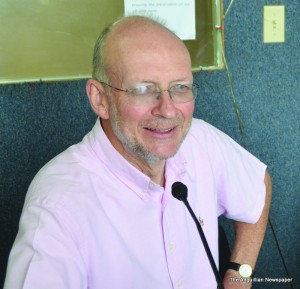
Crime in Anguilla was among a number of issues on which Governor Alistair Harrison commented in one of his most elaborate interviews in recent times on Wednesday this week.
“It is probably the most difficult area among my constitutional responsibilities,” Governor Harrison said, as regards the control of crime. “The Police report directly to me and that’s something I take extremely seriously throughout my time here. We did have a very difficult period last summer when we had three violent deaths in the space of a few months; and at the end of the year we had two further violent deaths – so we had five violent deaths in Anguilla last year compared to the previous few years when there hadn’t been any. It was obviously rather distressing to everybody.
“What I would like to say is that I think that the response of the Royal Anguilla Police Force under Rudie Proctor has been excellent. Without commenting on things that are sub judice, I would say that excellent progress has been made in investigating all of the crimes. A point which I always make is that the Police need the help of everyone in Anguilla in order to make progress. I have received some very important information but there are other areas and other instances where information has not been coming forward; and everybody has to think that if they have things to say that could help the Police they should do so.
“The other area I would like to highlight is that after those three violent deaths in quick succession, there was a special meeting of EXCO. I asked my Police Adviser who is resident in Miami, and advises all the Caribbean Overseas Territories Governors on police matters, to come to Anguilla. With a very full briefing from him and Commissioner Proctor, I had a very responsible discussion in EXCO as a result of which Ministers agreed to make more funds available to the RAPF to recruit more policemen – to bring the numbers up closer to the ideal establishment – and to modernise the fleet. I was also able to get some funding from the United Kingdom to help modernise some of the electronic equipment that they can use; and we will be announcing next week some new equipment that will help in the fight against crime… and that is a very valuable addition.”
The Governor emphasised that one crime in Anguilla was one too many. “Anguilla remains, by the standards of the region, a low crime jurisdiction, but equally it is very difficult to see a return to the days of forty or fifty years ago when there was almost no crime on an islandlike Anguilla. I think it is something that we all experience throughout the world and sadly an increase in gun-related crime. That’s something to which the Commissioner attaches a lot of importance to get rid of guns from Anguilla to lessen the chances of gun-related crime.
“I don’t think the answer is, as some people seem to think, that more people on Anguilla should be given gun licences. I think that should always be very sparing. We don’t want a situation where everybody is armed as happens in some parts of the United States, for example. The evidence of that doesn’t make a country safer. But, as I said, I think the RAPF do a very good job. Their clear-up rate is much greater percentage wise than that of much larger forces in Britain and America. Anguilla remains a low crime destination.
“There have been one or two crimes recently that affected the tourism industry and sadly, in the modern world, went viral on the internet. But I think that … Anguilla still is a tranquil island [and] we need the help of every Anguillian to keep it that way; and everybody, as I said, should support the Police in what they are doing.”
The Governor’s interview was on the recently-introduced Radio Anguilla programme, Talk Anguilla, hosted by Keithstone Greaves.








